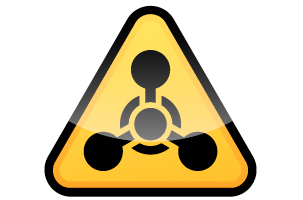 I rather hate to do this, but these first two paragraphs seem the best way to make this very important point. Apologies.
I rather hate to do this, but these first two paragraphs seem the best way to make this very important point. Apologies.
Imagine that some combination of circumstances end with you walking into a so-so bar, then accidentally causing some gigantic brute to spill his drink. Imagine also that this brute just learned that his girlfriend moved out, taking his bank account with her.
The brute, towering over you, clenches his fists and start spewing horrifying threats. Your knees go weak, you can barely think or move… you try to back up but do it so clumsily that you’re grasping the edge of the bar to prevent yourself from falling.
The brute hasn’t touched you, but you’ve already been seriously impacted. This happened because of well-known and well-studied chemicals… the chemicals that are now surging through your body. So, then, wasn’t this fear a chemical weapon? (It was, in fact, the bully’s first blow.)
Yes, the chemicals in question were generated by your own body, but they are chemicals just the same, and the actions of the brute were the cause of their release.
Fear, then, is clearly a chemical weapon. So are intimidation and shame. As are their cousins, guilt, blame, and probably a few others, depending upon how we write our definitions.
Robert Sapolsky studied the chemicals involved (he studied baboons, but their body chemistry and ours is nearly the same), finding that these “chemical weapons” resulted in more stress, higher blood pressure, a suppressed immune system, and reduced fertility. We must, then, consider these very potent weapons.
Consider these two cases, please:
- Solomon Asch found that about 37% of people were willing to say something they knew to be untrue if they saw other people saying so first. (Fearing their shame.) 75% would go along at least some of the time.
- Stanley Milgram found that 65% of people would obey an authority figure (an imposer of shame) and deliver electric shocks to another person, even to levels that would be fatal. (Though in fairness, the authority figure was accompanied by a plausible story.)
Our Unfortunate Biology
For both better and worse, we have a biological history. On one hand, that biological history has kept our species present and thriving, and so our complaints, however legitimate, are mitigated. On the other hand, however, our hormones, after who knows how many generations, have been trained to respond to things like authority and group identity. As a result they can release some very unpleasant and harmful chemicals into our bodies at certain times. And that’s something the manipulators of mankind have learned to use.
Our hormonal responses are not necessarily overwhelming, but they do have their effects… poisonous effects. By triggering fear, shame or intimidation (and the boundaries between them can be fuzzy), our hormones are triggered as well. And these hormones do more than just spur some of our thoughts and actions, they directly damage our health.
And, by the way, people display higher IQs and do far better in executive control tests when they are feeling less rather than more intimidated.
Western Guilt
We Westerners are especially susceptible to some of these influences because of our cultural traditions. These particular characteristics leave it vulnerable to guilt. As a result, we’ve developed political classes that are devoted to finding fault, assigning blame, and then offering paths to absolution that suit their selfish goals.
In other words, our civilization has been attacked with the chemical weapons of intimidation and shame, purposely and very effectively.
Blame, of course, is a method of assigning shame. Political types, especially – and very definitely authority types – thrive upon assigning shame. It has worked for them, time after time after time.
Nonetheless, our hormones, however long trained, can be managed. Prize fighters, football players and other repeated participants in violent activities learn how to manage those chemical attacks.
And so, we who are subjected to endless chemical attacks both large and small (even ads that make you feel insufficient qualify)… we are also able to manage our responses.
We must train ourselves to not respond to guilt.
We can consider facts, then repair and improve our actions if they are truly harmful, but merely feeling these weaponized chemicals is not to be taken as any sort of verdict. In most cases, it’s a hijacking of our internal chemistry, by and for professional abusers.
In point of fact, billions of dollars are spent every year, precisely to take advantage of our unfortunate biological history. And so I say again, we must train ourselves not to be moved by those chemical weapons… and particularly not to respond to guilt.
**
Paul Rosenberg
freemansperspective.com
